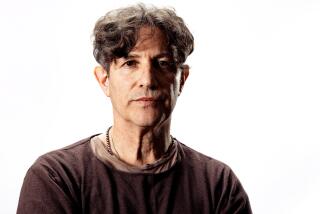French filmmaker François Ozon looks at secrets and lies in war’s aftermath with ‘Frantz’
- Share via
For a director regularly drawn to slipperiness and surprise, French filmmaker François Ozon (“Swimming Pool”) sounds almost unfamiliar with his own work when he reveals, “For a long time, I’ve wanted to make a film about secrets and lies.” Wasn’t 2013’s “Young & Beautiful,” about a teenager keeping her life as a prostitute from her parents? And 2014’s “The New Girlfriend,” built around a widower’s hidden penchant for cross-dressing?
But it’s a very different kind of subterfuge Ozon is exploring in his new film, “Frantz,” a black-and-white post-World War I tale of shared grief and tense rapprochement. In 1919 Germany, a young woman named Anna (newcomer Paula Beer) mourns her fiancé Frantz’s death, but who is the tearful Frenchman (Pierre Niney) visiting his grave with flowers?
In adapting a sentimental play by Maurice Rostand from the Lost Generation era (and first filmed by Ernst Lubitsch in 1932), Ozon chose to shift the point of view from the guilt-ridden French war veteran, named Adrien, to the intrigued Anna, thereby withholding the mystery of his connection to a German casualty.
“It’s a good opportunity to play with the audience, like Hitchcock did,” Ozon says in a recent phone interview. “So you are like the character of Anna, you ask questions. You make a movie in your head. You don’t have this suspense in the Lubitsch movie.”
What follows is a cagey dance of well-meaning deceit, as a common ground of sadness brings Adrien, Anna and Frantz’s loss-stricken parents toward a kind of healing. As with many of Ozon’s movies, storytelling fosters a connection between onetime enemies.
“It’s a film about lies, but about fiction too, and our need to believe,” he says. “When Adrien comes to Germany, he comes to tell the truth, but in front of people who want to hear something else, he tells them a fiction that maybe [helps] their pain.”
The German scenes were filmed in portions of the ex-Communist east still untouched by modernity, and for the first time, Ozon found himself primarily directing actors speaking a different language. What eased the challenge was the sense from the natives that this was no ordinary French take on their country. “Usually in French movies, the German is the bad guy. This time, you empathize with them,” says the director, who heard as much from German audiences when he promoted the movie there last year. “They were very touched that a French director made a film about them.”
Ozon goes so far as to mirror Adrien’s visiting Germany with a second half in which Anna travels to France, enduring her own foreign unease in a café when flush-with-victory patrons break out in “La Marseillaise.” Stripped of its underdog patriotism as in the famous “Casablanca” scene, or its uniting power after the Paris attacks, however, lines about cutting enemies’ throats and “impure blood” evoke something different.
“The lyrics are very violent,” says Ozon, who had in mind the queasy Biergarten scene from “Cabaret,” in which a Nazi’s lilting song grows increasingly nationalistic. “I thought it’d be interesting to hear the song in the context of war, especially from the point of view of the German character.”
Though Niney (“Yves Saint-Laurent”) is a known quantity in France — “he’s one of the best young actors,” says Ozon — the director’s on-screen Anna arose from an arduous search of young performers in Germany. “I had in mind a Romy Schneider, this kind of actress,” notes the director, referring to the beloved French star of the ’60s and ’70s. “Someone powerful and beautiful. When I met Paula [Beer], it was perfect. She was just 20 years old, but she had real maturity. The first scene we shot, she had a tear at the perfect moment. I realized I made the right choice.”
Another decision of Ozon’s was a last minute one, and made his producers nervous: not shooting in color. “There was a little fight,” he says, laughing. “But I had the feeling it would be stronger, more honest, because our memory of this time from so many films and documentaries is in black and white.”
And yet “Frantz” isn’t completely monochrome, with Ozon picking certain scenes — a character’s fond remembrance, a trip to the German countryside — for bursts of primary hues. “My personal tastes go to Technicolor, so I wanted these moments for that, like life coming back in this period of death.”
A director who’s aware of his established proclivities, Ozon admits he’s up to his old tricks again with his next film: an erotic thriller. “I realized ‘Frantz’ is my most chaste movie — there is no sex scene!” he says. “I wanted to go back to sex.”
See the most-read stories in Entertainment this hour »
Movie Trailers
More to Read
Only good movies
Get the Indie Focus newsletter, Mark Olsen's weekly guide to the world of cinema.
You may occasionally receive promotional content from the Los Angeles Times.










